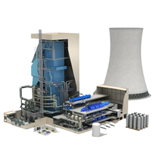Electrical engineer Nihal Kularatna, who arrived in New Zealand from Sri Lanka in 2002 and has been at Waikato since 2006, has been exploring possible new uses for energy storage devices called supercapacitors. These are beginning to appear in products as diverse as electric vehicles and memory backups for information technology equipment.
"We're trying to use these in some very crazy ways," Mr Kularatna says. "One is improving the efficiency of DC power supplies, because now everyone's focused on energy saving."
Internal components of electrical devices such as mobile phones and laptops require their power to be delivered at different voltages. There are two basic technologies that can be used for this. Linear power supplies deliver high quality power but at low efficiency, so the more efficient and compact switch mode systems are now more commonly used. These, however, generate a lot of electrical interference.
"To power some of the circuits on a cell phone you cannot use a switch mode, because that interferes with the high frequencies, so you always have to go with linear power supplies. We are using supercapacitors to improve the efficiency of linear power supplies."
The work received a boost when a colleague of Mr Kulatatna's from Sri Lanka, Jayathu Fernando, joined him at Waikato two years ago as a research and development engineer. They have now produced working prototypes, for which the university’s commercial arm has filed patents.
In these prototypes, waste energy from the linear power supply, which would otherwise have been dissipated as heat, is absorbed by the supercapacitor and re-used. With modern electrical equipment operating at ever-lower voltages, which switch mode power supplies don't handle very well, linear systems are likely to find many applications, if the efficiency issue can be overcome, Mr Kularatna says.
Traditional capacitors, which have long been used in electronic circuitry, store electrical charge on two conducting sheets separated by a thin insulating layer and tightly wrapped into a small parcel. Supercapacitors are based around activated charcoal or some other highly porous material, which gives them an enormous internal surface area and vastly greater electrical storage capacity. They are able to absorb and discharge large amounts of electricity very rapidly.
International undergrad student Lasantha Tillakaratne, also from Sri Lanka, has been spending the summer with Mr Kularatna refining the concept, and the two have now improved the efficiency of a low dropout regulator circuit from its original 42 per cent to more than 80 per cent.











-160x160-state_article-rel-cat.png)
-160x160-state_article-rel-cat.png)

-160x160-state_article-rel-cat.png)


-160x160-state_article-rel-cat.png)





